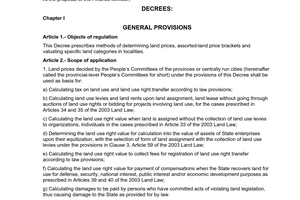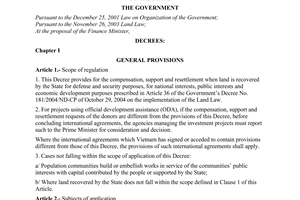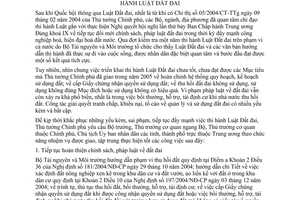Nội dung toàn văn Directive no. 05/2006/CT-TTg of February 22, 2006 on remedying weaknesses and violations in and further accelerating the implementation of the land law
|
THE
PRIME MINISTER OF GOVERNMENT |
SOCIALIST REPUBLIC OF VIET NAM |
|
No. 05/2006/CT-TTg |
Hanoi, February 22, 2006 |
DIRECTIVE
ON REMEDYING WEAKNESSES AND VIOLATIONS IN AND FURTHER ACCELERATING THE IMPLEMENTATION OF THE LAND LAW
After the National Assembly passed the Land Law, especially after the Prime Minister issued Directive No. 05/2004/CT-TTg on February 9, 2004, ministries, branches and localities have paid attention to directing the implementation of the Land Law in combination with the implementation of the Resolution of the 7th plenum of the IXth Party Central Committee on continued reform of land policies and law in the period of accelerated national industrialization and modernization. The inspection of the implementation of the Land Law over the past year throughout the country carried out by the Ministry of Natural Resource and Environment showed that the Land Law and its guiding documents have actually come into life, received great attention of the people, and brought about initial positive results.
However, the implementation of the Land Law still sees some weaknesses in general, failing to achieve the objectives assigned by the Prime Minister in 2005 regarding the finalization of the system of land-use plannings and plans; the grant of land-use certificates; the recovery of unused land, land used for improper purposes or used inefficiently. Violations of land law are rather common, especially in the work of compensation, support and resettlement when land is recovered by the State. There remain many weaknesses and shortcomings in the settlement of disputes, complaints and denunciations related to land management and use.
In order to remedy weaknesses and violations and further accelerate the implementation of the Land Law, the Prime Minister hereby requests ministers, heads of ministerial-level agencies and Government-attached agencies, and presidents of provincial/municipal People's Committees, within their assigned functions and tasks, to concentrate efforts on well performing the following tasks:
1. To continue perfecting land policies and law
The Ministry of Natural Resources and Environment shall guide the scope of land recovery specified at Point a, Clause 2, Article 36 of Decree No. 181/2004/ND-CP of October 29, 2004; guide in detail the identification of agricultural land situated intermingledly with residential land and gardens and ponds lying adjacent to residential areas, specified in Clause 2, Article 10 of Decree No. 197/2004/ND-CP of December 3, 2004; the order and procedures for land recovery, compensation and support, and resettlement; the grant of land-use right certificates upon recognition of land use rights, the compensations, support and resettlement when land is recovered by the State for cases of using land without papers on land-use rights, specified in Clause 4, Article 50 of the Land Law; the realization of preferences related to land-use rights for projects on socialization of education and training, health, culture, physical training and sport activities; and coordinate with the Supreme People's Court and the Supreme People's Procuracy in guiding the scope of land-related disputes and complaints to be settled by administrative agencies and people's courts.
The Ministry of Finance shall speed up the preparation of bills related to land-use tax and personal income tax on incomes from land-use right transfer so as to soon submit them to the Government for consideration and submission to the National Assembly; promulgate regulations on charges and fees in land management, unit prices for performance of non-business land management tasks, and mechanism of revenues and expenditures of land-use right registration offices and land fund development organizations.
The Ministry of Justice shall continue finalizing the Bill on Registration of Real Estate in the direction of building a centralized and unified registration system meeting management requirements, with convenient and simple procedures for enterprises and citizens to register real-estate rights and transactions; assume the prime responsibility for, and coordinate with the Ministry of Natural Resources and Environment in, guiding the settlement of problems arising in the registration of mortgage and guarantee using real estate.
Provincial/municipal People's Committees which fail to promulgate according to their competence legal documents as prescribed in the Land Law and guiding decrees, shall soon issue such documents, especially those providing for quotas for allocation and recognition of residential land, administrative order and procedures for land management and use, grant of land-use right certificates, compensation, support and resettlement when land is recovered by the State; and adjust local land price brackets in conformity with land price frames issued by the Government and the principles of determination of land prices specified in Article 56 of the Land Law.
2. To accelerate the dissemination and education of land law
The Ministry of Natural Resources and Environment shall assume the prime responsibility for, and coordinate with concerned ministries, branches, agencies and provincial/municipal People's Committees in, further directing and organizing the dissemination and education of land law in various ways suitable to each subject; and organize training to raise professional qualifications of land administrators, first of all, those at district and commune levels.
The Ministry of Culture and Information shall continue directing information and media agencies to concentrate on the dissemination and popularization of land law, praising units with good performance and criticizing units with delayed performance, detecting and exposing violations, especially acts of abusing positions and powers to misappropriate land or harassing or irresponsible acts in carrying out land-related administrative procedures; to direct the publishing and wide distribution of publications of land law, including those in ethnic minority languages, among people in all regions and areas nationwide.
3. To consolidate the organizational apparatus and step up administrative reforms rri land management
Provincial/municipal People's Committees shall scrutinize and consolidate the land management apparatuses and land-related public service provision organizations in their localities, first of all, the Natural Resources and Environment Bureaus, land-use right registration offices and land fund development organizations; consolidate the commune, ward and township cadastral contingent of staff with adequate qualifications, capacity and professionalism so as to put an end to the frequent change of cadastral staff.
The Ministry of Natural Resources and Environment, the Ministry of Finance and People's Committees at various levels shall inspect the implementation of administrative procedures in land management and procedures for the collection of land-related revenues; scrutinize regulations on administrative procedures so as to propose the promulgation of or promulgate according to their competence amendments thereto or annul those which are no longer necessary. The imposition of administrative procedures and revenues other than those set by competent state agencies is strictly prohibited.
Provincial/municipal People's Committees shall publicize investment locations and decisions on land recovery, allocation or lease for execution of investment projects so as to ensure transparency and equality in the access to land funds for investment.
4. To enhance the management of land-use plannings and plans
When making, evaluating and approving land-use plannings and plans, it is necessary to pay attention to the reasonable use of land of all kinds, restrict to the utmost the use of wet rice fields for non-agricultural purposes. From now on, plans to change wet rice fields into areas for non-agricultural production and service provision in localities, where it is possible to use land of other kinds for such purposes, shall not be approved. In localities where it is necessary to use wet rice fields for non-agricultural purposes, solutions must be worked out to ensure the economical and feasible use of land and avoid the situation that the recovered land is left unused.
Together with the finalization of a system of land-use plannings up to 2010 and land-use plans in the 2006-2010 period, right in 2006, People's Committees at all levels shall publicize approved land-use plannings and plans according to regulations; put an end to the situation of unrealizable plannings; regularly check and review decisions on land allocation, land lease, change of land-use purposes and land recovery so as to ensure that such decision are in line with approved land-use plannings and plans.
5. To speed up the grant of land-use right certificates
Provincial/municipal People's Committees shall speed up the grant of land-use right certificates; annul, amend or promulgate documents on the grant and withdrawal of land-use right certificates in conformity with current provisions of land law; and correctly apply the provisions of land law when considering and recognizing land-use rights of current land users, recognizing residential land areas, and determining financial obligations of land users upon the grant of land-use right certificates. Localities where only small number of land-use right certificates have been granted should strive for completion of the grant of land-use right certificates in 2006. To associate the grant of land-use right certificates with the continued finalization of cadastral dossiers.
6. To resolutely recover land in violation of land law
Provincial/municipal People's Committees shall inspect the use of land by agencies, units, enterprises and investment projects in their respective localities so as to detect and resolutely recover land areas allocated or leased to ineligible subjects; land allocated or leased by the State but left unused or used not according to schedule, inefficiently or for improper purposes; in cases where there are plausible reasons, to issue and publicize decisions on extension of land use duration.
The Ministry of Agriculture and Rural Development and provincial/municipal People's Committees shall direct the speeding up of the reorganization and renewal of state-owned agricultural and forestry farms and the reduction of land areas under the management of such farms to an essential level and transfer of the remaining areas to localities for allocation to farmers who have insufficient land or have no land for production, with priority given to ethnic minority households.
Ministries, ministerial-level agencies, Government-attached agencies and corporations 91 shall review land areas allocated or leased by the State to non-business agencies and units and enterprises under their management and take initiative in transferring areas which they no longer need to use or are using inefficiently to provinces or centrally-run cities. Ministries and branches shall not interfere into the recovery of land by localities from units under their management which violate the provisions of law on land management and use.
The results of implementation of tasks defined in this section shall be reported to the Ministry of Natural Resources and Environment before June 30, 2006, for summing up and reporting to the Prime Minister.
7. To well perform the work of compensation, support and resettlement upon land recovery
Provincial/municipal People's Committees shall direct the implementation of provisions of laws on compensation, support and resettlement when land is recovered by the State for use for defense, security purposes, national and public interests or economic development; make public the entire process of implementation; ensure fairness between subjects with similar conditions. Special attention should be paid to the following issues:
- To ensure that land prices used for making compensation comply with land price determination principles specified in Article 56 of the Land Law. In localities where the aforesaid land price-setting principles cannot be complied with though all land price brackets issued togetherwith the Government's Decree No. 188/2004/ND-CP of November 16, 2004, have been referred to, local administrations shall report their difficulties to the Ministry of Finance for submission to the Prime Minister for settlement. The implementation of compensation, support and relocation policies shall not be retrospective, but localities should, depending on their practical situation and conditions, apply policies and law in a satisfactory manner on the principle of "for the interests of people," to meet the requirement of stabilizing the local situation and not causing new complicated problems.
- To well perform resettlement work, set aside favorable land areas, including those near industrial parks, for resettlement (except for cases of consideration of environmental protection requirements or shortage of land), ensuring that households whose land is recovered shall have new homes in resettlement areas. When making plans on industrial parks or expansion of urban centers or rural residential areas, attention must be paid to reserving land funds for on-the-spot resettlement. From now on, localities shall not be allowed to force the demolition of dwelling houses of persons whose land is recovered while they have not yet been offered places of resettlement.
- To actively direct the creation of jobs for households whose land is recovered. Apart from the relocation of such households to favorable places or places near industrial parks in combination with the development of services to create jobs, it is necessary to devise other measures to ensure jobs and incomes for persons whose land is recovered, not to leaving them unemployed or poverished.
The Ministry of Finance shall direct the evaluation of the application of land price frames to setting prices for compensation upon land recovery, especially those applicable to agricultural land, promptly propose to the Prime Minister necessary amendments and supplements thereto; propose financial mechanisms and policies to encourage land users to lease land or contribute capital with land use rights to investors who have demands for land.
8. To speed up the settlement of land-related disputes, complaints and denunciations
To create a strong and marked improvement in the settlement of land-related disputes, complaints and denunciations so as to complete the settlement of complaints and denunciations not yet settled while promptly settling newly-arisen ones according to the provisions of laws.
Presidents of People's Committees at various levels shall directly instruct the settlement of disputes, complaints and denunciations according to the provisions of law, effectively overcome the delay or shirking of responsibility in the settlement of complaints and denunciations; attach importance to the organization of dialogues between the complainants and agencies or individuals that have issued complained administrative decisions or committed complained administrative acts.
Where the complaints or denunciations have been settled by administrative agencies or people's courts in strict accordance with the provisions of law and in compliance with the practical conditions, but the complainants still refuse to obey settlement decisions, commit acts of provoking and cause public disorder, handling measures shall be applied according to the provisions of law.
People's Committees at various levels shall have to perfect the work of citizen reception, provide complete and specific legal guidance to those who file written complaints or make verbal complaints at the places of citizen reception; to make public telephone numbers, fax numbers, mailing addresses and e-mail addresses for receiving citizens' reports or proposals.
The Ministry of Natural Resources and Environment and the Government Inspectorate shall inspect, urge and report to the Prime Minister on the settlement of complaints by localities, propose the reward and commendation of localities which have recorded achievements and the criticism and handling of presidents of People's Committees of provinces and centrally-run cities that fail to well perform this task, leading to many unsettled land-related complaints and denunciations.
9. To enhance the inspection and examination of the observance of land law
People's Committees of district and provincial levels shall make plans on periodical self-inspection as well as inspection of the observance of land law by their subordinate agencies. Commune-level People's Committees shall seriously perform the tasks of detecting, preventing and handling violations of land law and bear responsibility before law for violations of land laws occurring in their respective localities and entailing serious consequences due to their irresponsibility.
The Ministry of Natural Resources and Environment shall continue inspecting the observance of land law by investment projects on construction of industrial parks, service centers, urban centers or rural residential areas; the use of land by administrative and non-business units and state enterprises that were allocated land before the effective date of the 2003 Land Law.
Through inspection, examination and settlement of complaints and denunciations, to detect and strictly handle violations of law, especially cases of abusing positions and powers to illegally allocate land or of seeking illegal profits through land allocation, land lease, permission of change of land-use purposes and ground clearance.
The Ministry of Home Affairs shall consider and arrange necessary payrolls so as to enhance the apparatus of the specialized land inspectorate, ensuring the successful implementation of tasks prescribed by inspection law and meeting the requirements of corruption combat in the land domain.
Ministers, heads of ministerial-level agencies and Government-attached agencies, and presidents of provincial/municipal People's Committees shall direct the evaluation of the implementation of land law in their units and localities over the past time, and devise detailed and appropriate plans and measures to create marked improvements in land management, attaching great importance to the maximum restriction of new violations.
The Ministry of Natural Resources and Environment shall monitor and inspect the implementation of this Directive by ministries, branches and localities and periodically report the results thereof to the Prime Minister.
|
|
PRIME MINISTER |



